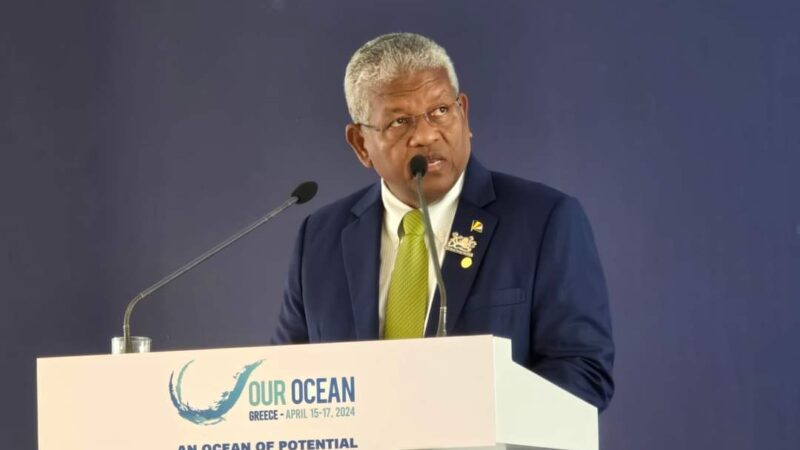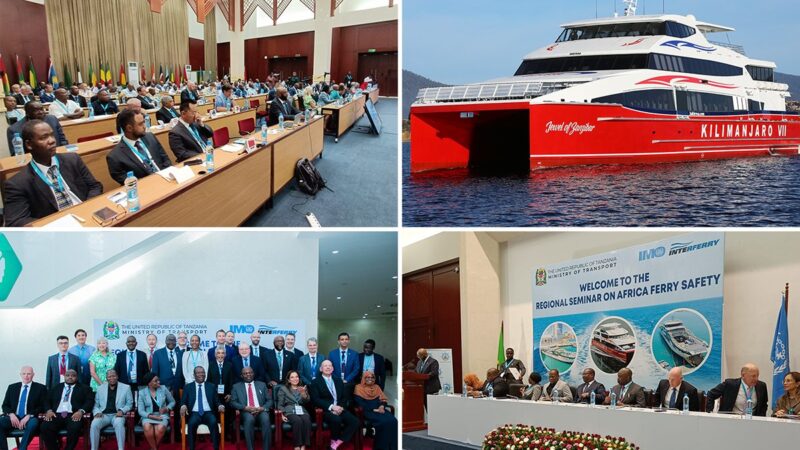Dr Fridtjof Nansen is back in African waters with first research survey since March 2020
On Saturday 9 October 2021, the research vessel, Dr Fridtjof Nansen, set sail for Las Palmas, in the Canary Islands, to restart the research surveys as part of the EAF-Nansen Programme. It has been a long time coming, after a long break caused by the Covid-19 pandemic, which forced the vessel to go back to Norway in March 2020. Since then, the vessel has been operating in Norwegian waters, but now it is time to return to Africa.

“I am happy that Norad’s research vessel will now return to African waters. It is more important than ever to protect our oceans and marine resources, and Dr Fridtjof Nansen provides a unique contribution through collection of physical and biological information from surveys in African waters and the Bay of Bengal. On behalf of Norad, I wish the captain and the crew from the Norwegian Institute of Marine Research (IMR) a safe voyage,” said Norad’s Director General, Bård Vegar Solhjell, when the ship left Norway earlier this month.
The first survey is taking place from 22 October to 16 November, with the aim to carry out environmental monitoring and bottom habitat mapping in Northwest Africa, off Mauritania and Senegal. In addition to the crew from IMR, that is operating the vessel, survey participants include IMR scientists as well as scientists and technicians from countries bordering the survey area, as a way of strengthening collaboration and building capacity of partner countries. In total, 27 participants – 17 local participants (including 2 women) and 10 from IMR – will join the first leg.
This expedition will focus on developing a baseline for present and future monitoring of possible impacts of oil and gas activities on benthic ecosystems and identifying the occurrence of benthic habitats (habitats occurring at the sea bottom) that require management attention. The priority areas have been identified by partners from the region, based on the knowledge of the presence of vulnerable benthic ecosystems (cold-water coral reefs), the localization of oil and gas exploration and production sites.
“The prime objective of this survey is to develop a baseline for environmental monitoring of possible future impacts related to hydrocarbon extraction activities in Senegal“, said Dr Abdoulaye Sarré, marine biologist at the Oceanographic Research Centre of Dakar-Thiaroye (CRODT) of the Senegalese Institute for Agricultural Research (ISRA), and a co-cruise leader of the Nansen research survey. “We hope this study will give us a solid base to be able to compare the current state of the ecosystem with the state of the ecosystem after-exploitation,” added Dr Abdoulaye Sarré.
The use of the Programme’s research vessel will play a crucial role for collecting data necessary for the preparation of the baseline.
“Thanks to the research vessel Dr Fridtjof Nansen, it will be possible to study the areas which the vessel belonging to the Mauritanian Institute of Oceanographic Research and Fisheries (IMROP) has no capacity to cover,” said Dr Moulaye Wagne, Research Assistant at IMROP and a co-cruise leader of the Nansen research survey. “Mauritania will benefit from the Norwegian experience on the environmental monitoring in relation to hydrocarbon extraction. In fact, this monitoring will be ensured in accordance with the recommendations of the OSPAR Convention for the Protection of the Marine Environment of the North-East Atlantic,” added Dr Wagne.
During the expedition, samples will be collected along 4-6 sampling lines (transects) stretching from coastal waters of 100 m depth and down to a maximum of 2000 metres depth on the continental slope. Furthermore, video surveys of the seabed (habitat mapping) will be carried out at appointed sites along the transects. The Grand Tortue Ahmeyim (GTA) gas field development project, overlapping Mauritania and Senegal’s offshore waters, has been selected as target for the surveys and the creation of a baseline for monitoring possible impacts of gas activities.
Research surveys with the Dr Fridtjof Nansen follow the research activities set out in the Science Plan of the EAF-Nansen Programme. This leg of the expedition will respond to the scientific objectives under Theme 5 (oil/gas activities and their impacts on marine ecosystems), Theme 7 (habitat mapping: identification of vulnerable and critical habitats) and the cross-cutting Theme 11 (Ecosystem characterisation: past, present), specifically.
During each survey, the cruise leader, who is a scientist from IMR, is expected to ensure that sampling is carried out according to agreed standards and objectives. The co-cruise leader, who is a scientist from partner countries, assists the cruise leader on all aspects of a survey implementation, including supervision of the teams, data collection, analysis, and reporting. For this survey, both co-cruise leaders Dr Wagne and Dr Sarré attended the first-ever co-cruise leader training that was organized in February 2020 with the aim to enable scientists from the Programme partner countries to effectively assist the cruise leaders and thus develop experience in leading a scientific expedition.
“The prime objective of this survey is to develop a baseline for environmental monitoring of possible future impacts related to hydrocarbon extraction activities in Senegal. We hope this work will give us a solid base to be able to compare the current state of the ecosystem with the state of the ecosystem post exploitation,“ said Dr Sarré. “For many scientists, an opportunity to use new facilities on board the vessel such as Video Assisted Multisampler or Water-Rosette Sampler will largely contribute to the development of national capacities, which is one of prime objectives of the EAF-Nansen Programme,” Dr Sarré added.
This survey is the first of the two surveys that are planned to take place before the end of the year. The second scientific expedition – an ecosystem survey – will take place in November, in the waters of Cabo Verde. In addition, there is more even in store for 2022, as the activities carried out onboard the Dr Fridtjof Nansen are at the core of the EAF-Nansen Programme.
“The research surveys are key as they provide necessary knowledge in support of the partner countries’ efforts towards more sustainable fisheries management and improved food security, bringing countries closer towards reaching the UN Sustainable Development Goals by the 2030 deadline,” said Merete Tandstad, EAF-Nansen Programme Coordinator.
Source : FAO



